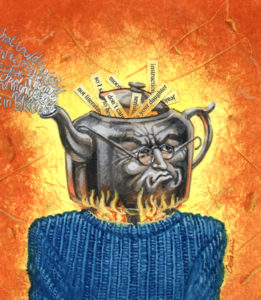This has been bugging me for a while, and I found myself with some time to spare today, so I figured I’d get it down. I need to explain why I think – contrary to received wisdom – most fiction writers are at least as much capitalists as socialists, and why I think that terms such as ‘capitalist’, ‘professionalism’ and ‘good business sense’ seem to have been subverted in the media.
When I made the very deliberate decision that I wanted to be a illustrator, and then later, to be a writer too, I didn’t know quite what I was in for, but I had a fair idea. I took a risk in setting myself up in business – quite a substantial risk, given that, as I now know, there could be less than twenty people in Ireland making a full-time living from writing and/or illustrating children’s books.
I did not believe in the even distribution of wealth – though I don’t think that’s the same as a fair distribution of wealth. I did not believe that the state owed me a living. I developed my skills to the best of my ability, I took risks and promoted myself because I wanted the emotional, social and financial rewards that I hoped I would achieve as a result. You don’t become self-employed if you believe that everyone is entitled to an equal share of those rewards.
I am a businessman, and like most self-employed people – and unlike most of those working for large companies – I face the rigours of business, of capitalism, firsthand. I reap the rewards and I pay for the failures. There is no corporate structure providing me with the former, o r protecting me from the latter. As far as I’m concerned, that’s what it means to be in business, as opposed to working for one. And my ability to stay in business is largely decided by my professionalism; how well I do my work, whether I do what I say I will, to a sufficient quality, in the time agreed.
r protecting me from the latter. As far as I’m concerned, that’s what it means to be in business, as opposed to working for one. And my ability to stay in business is largely decided by my professionalism; how well I do my work, whether I do what I say I will, to a sufficient quality, in the time agreed.
So when I hear the media talking about companies such as banks as if they are cornerstones of professionalism in business, I take exception to their use of definitions such as ‘business’, ‘professionalism’, and ‘the market’, and how they relate to the behaviour of people who run these banks. They use them as if these people have ownership of these terms, as if they understand them better than others, who do not run banks or sit on boards.
And what bugs me most, is the apparent awe with which our politicians treat these people, and the way the rest of us are spoken to as if we are at some lower level of business, innocent onlookers in the world of ‘the market’.
If a bank has to be underpinned by government handouts to protect society from its collapse, this is a socialist move to support a badly run, unprofessional business. If that bank and a few others like it, find themselves in a market without competition, because every other ‘professional’ running these businesses acted equally foolishly, resulting in an implosion in the industry, the government that is now propping up this near-monopoly of monolithic institutions should not allow the perpetrators of these disastrously-led business entities to dictate the definitions of ‘business’ and ‘free market’ and ‘professionalism’, as they clearly don’t understand them.
If the people who run a business are not held responsible for the decisions that led to its collapse, are not forced to pay the price of that business’s recovery, and are in fact rewarded with increases in pay for victimizing the customers of that business – if they are not made to realize the financial consequences of their actions, then they are not ‘in business’. They are living in some kind of fantasy land – a fictional world, paid for by the work and professionalism of others. And unfortunately, it is this world to which most of their subordinates aspire too. Ironically, it is a fictional world that no writer of fiction, for instance, is ever likely to inhabit.
So when I hear people in the media say that public servants should work more, and more efficiently, for less money; that there is too much waste in the public sector; that the private sector is inherently more efficient; when I hear banks offering business advice to small businesses while at the same time cutting services and becoming unreachable to their customers; when I see big businesses lobbying government for ever more advantages while accusing the public sector of bleeding the country dry; when I am told that my business must pay yet another tax to dig the country out of a hole created by huge corporate entities, it makes me utterly sick.
And when I see the same people who have made life so much harder for every business in this country, still in their jobs, still being paid the same money, still receiving fucking bonuses for running their businesses so badly that their companies had to go on the dole, I think it’s time someone gave them a good slap and explained to them what it means to be ‘in business’.
